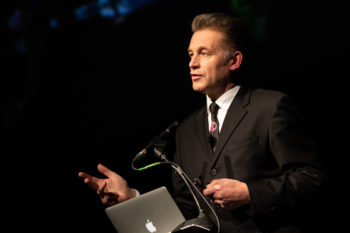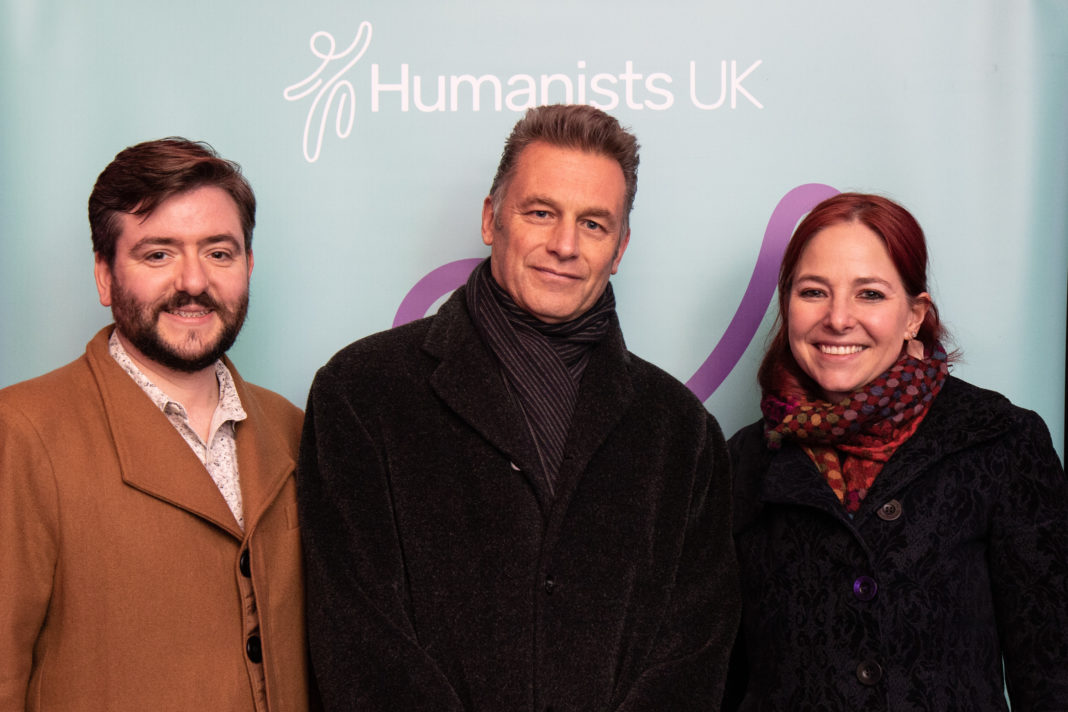
Chris Packham CBE – naturalist, television presenter, writer, photographer, conservationist, campaigner, and filmmaker – delivered the Humanists UK Darwin Day Lecture to an audience of nearly 2,000 people in central London held on Darwin Day, 12 February. It was the 18th Humanists UK Darwin Day Lecture in London, an annual celebration of the life and work of the naturalist Charles Darwin, held on the anniversary of his birth each year.
Introducing the lecture, Professor Roberts linked the theme of Chris’s talk to Darwin’s own work. In a much-quoted passage from The Descent of Man, Darwin wrote:
As man advances in civilisation, and small tribes are united into larger communities, the simplest reason would tell each individual that he ought to extend his social instincts and sympathies to all the members of the same nation, though personally unknown to him. This point being once reached, there is only an artificial barrier to prevent his sympathies extending to the men of all nations and races… This virtue, one of the noblest with which man is endowed, seems to arise incidentally from our sympathies becoming more tender and more widely diffused, until they are extended to all sentient beings.
It was right, she said, that in 2020, we should be returning to such Darwinian ideas about our connectedness as human beings to the whole of the natural world.
Chris began his wide-ranging talk by speaking about his early affinity for animals and nature. Observing a generation for whom indoor play and time with smartphones defined leisure activity, he expressed a desire for young people to rediscover a love of the outdoors – getting their hands dirty by playing with tadpoles, frogs, and insects – that for him structured the events of childhood and in doing so kindled a lifelong love of all things living. That curiosity and love of nature, he said, will be necessary if the next generation is to stand the challenges facing humanity that they will surely have to live with and deal with.
As his lecture drew to a close, Packham explored increasingly troubling themes. Of particular concern was the decline of biodiversity on Earth as a result of human intervention, and the calamitous knock-on effects this has on flora and fauna both in the UK and around the world. Drawing upon his experiences of living among indigenous Indonesian communities, he discussed what people in the developed world could stand to learn from these tribes in harmony – an ethos of living as part of their native ecosystems, not dominating them as if awarded a divine right to do so.
Later in his talk, Chris pleaded to his audience that time was up: action on climate change had to begin now, and it had to begin not only with pushing for state-level intervention, but in our daily habits. The road to getting there would not be easy and would need to be delicate. Reduce your meat consumption, he advised – but try not to be a zealous preacher for veganism, which will only put people off the cause and do more harm than good. Instead, he suggested, be an encouraging friend and peer to anyone making even partial steps towards a more sustainable future. Direct your anger, instead, to those in power.
His presiding theme was one of hope – not defeatism. It is only hope that will lead to change and the prolongation of life on this planet. Before being treated to a standing ovation, he concluded with a call to arms: ‘As humanists, we must not give up on these generation-defining issues’.
Following the lecture and in recognition of his work as a naturalist, broadcaster, and campaigner, Alice Roberts concluded the evening by presenting Chris Packham with the prestigious Darwin Day Lecture Medal.

Notes
The Darwin Day Lecture explores humanism and humanist thought as related to science and evolution, Charles Darwin, or his works. The Darwin medallist has made a significant contribution in one of these fields. The lecture and medal are named and held to mark the annual global celebration of the birth of Charles Darwin, held every 12 February. Humanists UK’s annual Darwin Day Lecture in London is the largest Darwin Day event held anywhere in the world.
In addition to the Darwin Day Lecture, the Humanists UK Annual Lecture series includes the Rosalind Franklin Lecture to mark International Women’s Day, and the Voltaire Lecture in London. The Holyoake Lecture, named after secularist George Holyoake and held in Manchester, examines an aspect of politics or contemporary social or political issue, especially as it relates to secularist and humanist issues, while the Blackham Lecture, named after the humanist philosopher and first Executive Director of Humanists UK Harold Blackham and held in Birmingham, explores an aspect of education, either philosophical, practical, or social, that relates to humanism.
Humanists UK is the national charity working on behalf of non-religious people. Powered by over 85,000 members and supporters, we advance free thinking and promote humanism to create a tolerant society where rational thinking and kindness prevail. We provide ceremonies, pastoral care, education, and support services benefitting over a million people every year and our campaigns advance humanist thinking on ethical issues, human rights, and equal treatment for all.
